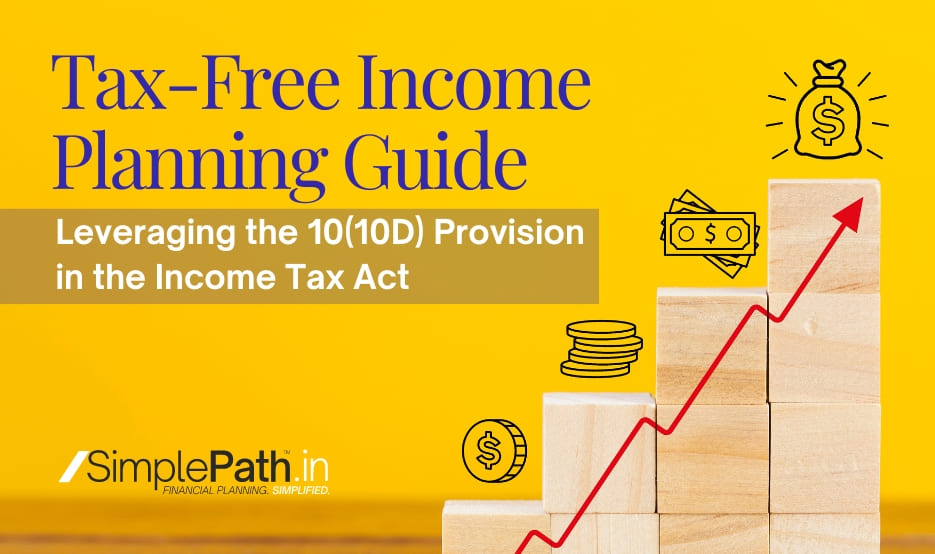The Income Tax Act is designed to ensure fair taxation and revenue generation for governments. However, within its provisions ‘lies a unique opportunity’ for individuals and businesses in India, to strategically plan their income to minimize tax liabilities. If you are looking for Tax-Free Income Planning one such provision is Section 10, which offers a means to receive income without incurring income tax.
In this article, we will explore how this provision can be utilized for Tax-Free Income Planning.
Income Exempt from Tax as Per Section 10
Most income that is exempted from tax is listed under Section 10 of the Income Tax Act. This section contains a list of income that is deemed or considered to be free from taxation. Exempted income specified under Section 10 is as follows:
| Section | Exemptions |
| Section 10(1) | Income earned through agricultural means |
| Section 10(2) | Any amount received by an individual through a coparcener from an HUF |
| Section 10(2A) | Income received by partners of a firm, as shared between them |
| Section 10(4)(i) | Any interest that has been paid to a person who is not a resident Indian |
| Section 10(4)(ii) | Any interest that has been paid to the account of a person who is not a resident Indian |
| Section 10(4B) | Any interest that has been paid to a person who is not a resident Indian, but of Indian origin |
| Section 10(5) | Concession on travel given to an employee who is also a citizen of India |
| Section 10(6) | Any income earned or received by a non-Indian citizen |
| Section 10(6A), (6B), (6BB), (6C) | Government tax paid on the income of a foreign firm |
| Section 10(7) | Allowances received by government employees stationed abroad |
| Section 10(8) | Income earned by foreign employees in India under the Cooperative Technical Assistance Program |
| Section 10(8A) | Income earned by a consultant |
| Section 10(8B) | Income earned by a consultant’s staff or employees |
| Section 10(9) | Income earned by any family member of a foreign employee in India under the Cooperative Technical Assistance Program |
| Section 10(10) | Gratuity |
| Section 10(10A) | The commuted value of the pension earned by an individual |
| Section 10(10AA) | Any amount earned via encashment of leave at the time of retirement |
| Section 10(10B) | Compensation paid to workers due to relocation |
| Section 10(10BB) | Any remittance obtained as per the Bhopal Gas Leak Disaster Act 1985 |
| Section 10(10BC) | Any compensation obtained in the event of a disaster |
| Section 10(10C) | Compensation in lieu of retirement from a PBC or any other firm |
| Section 10(10CC) | Any income received through taxation on perquisites |
| Section 10(10D) | Any amount acquired via a Life insurance policy |
| Section 10(11) | Any payment received via the Statutory Provident Fund |
| Section 10(12) | Any payment received via a recognised or authorised Fund |
| Section 10(13) | Any payment received through a Superannuation Fund |
| Section 10(13A) | House Rent Allowance |
| Section 10(14) | Allowances utilised to meet business expenses |
| Section 10(15) | Income received in the form of interest |
| Section 10(15A) | Income received by an Indian firm through the lease of an aircraft from a foreign firm or government |
| Section 10(16) | Income in the form of a scholarship |
| Section 10(17) | Allowances granted to MLCs, MLAs or MPs |
| Section 10(17A) | Income received in the form of a government award |
| Section 10(18) | Income received in the form of pension by winners of awards for heroism |
| Section 10(19) | Income received by family members of the armed forces in the form of pension |
| Section 10(19A) | Income received from a single palace of an exruler |
| Section 10(20) | Income received by a localised body or authority |
| Section 10(21) | Income received by an association involved with scientific research |
| Section 10(22B) | Income earned by a news or broadcasting agency |
| Section 10(23A) | Income earned by certain Professional Institutes |
| Section 10(23AA) | Income acquired through Regimental Fund |
| Section 10(23AAA) | Income acquired through an employee welfare fund |
| Section 10(23MB) | Insurance pension fund income |
| Section 10(23B) | Income earned by village industry development institutions |
| Section 10(23BB) | Income earned by state level Khadi and Village Industries Board |
| Section 10(23BBA) | Income earned by regulatory bodies of institutions affiliated with religion and charity |
| Section 10(23BBB) | Income received by the European Economic Community |
| Section 10(23BBC) | Income received through SAARC funded regional projects |
| Section 10(23BBE) | Income received by the IRDA |
| Section 10(23BBH) | Income received through Prasar Bharti |
| Section 10(23C) | Income received by any individual through certain specified funds |
| Section 10(23D) | Income earned via Mutual Funds |
| Section 10(23DA)j | Income earned via a Securitisation Trust |
| Section 10(23EA) | Income earned through an IPF |
| Section 10(23EB) | Income received by the Credit Guarantee Trust for Small Industries |
| Section 10(23ED) | Income exemption of IPF |
| Section 10(23DFB) | Income exemption of specified income received by Venture Capital Firms, Funds or Businesses |
| Section 10(24) | Income earned by authorised trade unions |
| Section 10(25) | Income earned via provident funds and superannuation funds |
| Section 10(25A) | Income earned via Employee’s State Insurance Fund |
| Section 10(26), 10(26A) | Income earned by Schedule Tribe Members |
| Section 10(26AAN) | Income earned by an individual of Sikkimese origin |
| Section 10(26AAB) | Marketing regulation with regards to agricultural produce |
| Section 10(26B) | Income earned by corporations established for the upliftment of backward tribes and classes |
| Section 10(26BB) | Income earned by corporations established for the protection of Minority interests |
| Section 10(26BBB) | Income earned by corporations established for former servicemen |
| Section 10(27) | Income earned by cooperative societies established for protection of scheduled castes and tribes interests |
| Section 10(29A) | Income received by Community Boards |
| Section 10(30) | Income earned in the form of subsidies via the Tea Board |
| Section 10(31) | Income earned in the form of subsidies via the concerned Board |
| Section 10(32) | Income earned by a child in accordance with Section 64 of the Income Tax Act |
| Section 10(33) | Income earned through Unit Trust of India capital asset transfer |
| Section 10(34) | Income earned in the form of dividends through an Indian firm |
| Section 10(34A) | Income earned by a shareholder through the buyback of unlisted companies |
| Section 10(35) | Income received through the sale or transfer of Unit Trust of India units as well as other mutual funds |
| Section 10(35A) | Income from a securitisation trust that is exempt |
| Section 10(36) | Income received on the sale of shares under specific conditions |
| Section 10(37) | Any capital gains made on the mandatory acquirement of land in relation to urban agriculture |
| Section 10(38) | Any long term capital gains made from share and security transfers that fall under the purview of Security Transaction Tax |
| Section 10(39) | Any income received from any international event or function relating to sports |
| Section 10(40) | Any income acquired in the form of a grant from a company deemed to be a subsidiary of the parent company |
| Section 10(41) | Any income received on any asset transfer of a company or project that conducts power distribution, generation and transmission |
| Section 10(42) | Any income earned by any authority that has been established by more than one country |
| Section 10(43) | Any income in relation to reversal of mortgage |
| Section 10(44) | Income generated through the NPS Trust |
| Section 10(45) | Any allowance or perks granted to the chairman or any member of the UPSC |
| Section 10(46) | Any income that comes under the category of ‘specified income’ with regards to specific authoritative bodies |
| Section 10(47) | Any income that is exempt under the category of infrastructure debt fund |
| Section 10(48) | Any income earned by a foreign firm or company due to crude oil sales within India |
| Section 10(49) | Any income earned by the NFHC (National Finance Holdings Company) |
Tax-Free Income Planning for Everyone – Understanding 10(10D)
While there are a few sources of income listed that are exempted from income tax, for the mass population in India, Section 10(10D) of the Income Tax Act pertains to the tax treatment of proceeds from life insurance policies. This is your ticket to planning tax-free income.
Under Section 10 (10D) of the Income Tax Act, 1961, an individual can avail of tax exemption on the sum assured and accrued bonus (if any) received through their life insurance policy claim (maturity or death benefit). This exemption is also applicable for the returns earned from a ULIP and available on all forms of life insurance policy claims.
Originally it stated that any sum received, including the sum allocated by way of bonus, under a life insurance policy issued on or after April 1, 2003, shall be exempt from income tax.
However, in the Union Budget 2023, a monetary limit was proposed (now enforced) on other life insurance policies, and the following provisions have been inserted in Section 10(10D) in this respect:
- It is provided that no exemption shall be available in respect of life insurance policies (excluding ULIP) issued on or after 01-04-2023 if the premium payable for any year during the term of the policy exceeds 5 lakhs [Sixth proviso to Section 10(10D)].
- If the premium is payable by a person for more than one life insurance policy, the exemption shall be available only for those life insurance policies (other than ULIPs), where the aggregate amount of premium does not exceed 5 lakhs in any of the previous years during the term of any of those policies [Seventh proviso to Section 10(10D)].
- The above provisos shall not apply where the sum is received on the death of a person [Eighth proviso to Section 10(10D)]. In such case, the claim amount received by the beneficiaries would be tax-free.
- As per the amendments proposed in the Finance Bill 2021, exemption under section 10(10D) of the Income Tax Act, 1961 shall not apply to the ULIP plans issued on or after February 1, 2021, where the aggregate annual premium of all ULIP plans payable in the financial year exceeds INR 2,50,000/-
This exemption is subject to certain conditions, such as the premium paid not exceeding a certain percentage of the sum assured.
To qualify for this tax exemption or when planning a tax-free income, certain conditions must be met:
1. Date of Issuance: Policies issued before April 1, 2003 are not eligible for the benefits under Section 10(10D).
2. Premium Limit: The premium paid in any year during the policy tenure should not exceed a certain percentage of the sum assured. The exact percentage may vary based on the specific policy and the terms set by the insurance company.
3. Continuity of the Policy: The policy must be in force for a minimum period as specified by the income tax regulations. If the policy is terminated prematurely, the tax exemption benefits under Section 10(10D) may be forfeited.
It is important to note that the exemption under Section 10(10D) applies to the proceeds received from the life insurance policy, including the sum assured and any bonuses allocated. This provision does not cover the premiums paid towards the policy. The premiums paid are generally not eligible for any income tax deduction unless they meet the criteria specified under other sections of the Income Tax Act, such as Section 80C for specific life insurance policies.
Moreover, the tax exemption under 10(10D) applies to the sum received from a life insurance policy in any form, such as maturity proceeds, surrender value, or death benefits.
Overall, Section 10(10D) provides a favourable tax treatment for the proceeds from qualifying life insurance policies. By meeting the necessary conditions and understanding the specific requirements set by the Income Tax Act, individuals can avail themselves of the tax exemption benefits offered under this provision, thereby enabling tax-efficient income planning and ensuring financial security.
Overview of Tax on Various Life Insurance Policies
| Particulars | Term Insurance | Endowment Policy | ULIPs |
| Deduction under section 80C for premium paid | Up to 10% of sum assured | Up to 10% of sum assured | Up to 10% of sum assured |
| Exemption under Section 10(10D) | Exempt | Exempt if premium payable for any year during the term of policy is does not exceed 10% of sum assured and Rs.5,00,000 | Exempt if premium payable for any year during the term of policy does not exceed 10% of sum assured and Rs.2,50,000 |
| Relevant head of income | Not Taxable | Other Sources | Capital Gain |
| Tax rates | Not taxable | Normal Slab Rate |
|
Strategic Planning for Tax-Free Income
1. Choosing the Right Life Insurance Policy:
To take advantage of the 10(10D) provision, it is crucial to select a life insurance policy that aligns with your financial goals. Ensure that the policy meets the requirements for tax exemption under this provision, such as the sum assured being at least 10 times the premium paid in any year.
2. Policy Maturity:
By structuring your life insurance policy to mature at a particular time, you can receive a lump sum payout upon maturity that is exempt from income tax under 10(10D). This can be particularly advantageous if you require a significant amount of funds at a specific point in the future, such as retirement or funding a child’s education.
3. Systematic / Partial Withdrawals:
Certain life insurance policies allow policyholders to make systematic monthly/annual partial withdrawals during the policy tenure. These withdrawals may not be subject to income tax under 10(10D) if they meet the necessary conditions. Utilizing this feature strategically can provide a tax-efficient source of income when needed.
4. Premium Allocation:
Policyholders can structure their premium allocation to ensure that the maximum portion goes towards the sum assured rather than investment-linked components of the policy. This approach can help maximize the tax exemption benefits under 10(10D).
5. Tax Planning with Riders:
Additional riders such as critical illness or disability coverage can be added to a life insurance policy. These riders may also offer tax benefits, further enhancing your tax-efficient income planning.
Seeking Professional Advice for Tax-Free Income Planning
Given the complexities and potential implications of tax planning, it is essential to consult with a qualified financial advisor at SimplePath. We can guide you in understanding the nuances of 10(10D) and help tailor your financial strategy to ensure compliance with tax regulations while maximizing the benefits available.
Conclusion on Tax-Free Income Planning with Section 10(10D)
The 10(10D) provision in the Income Tax Act provides individuals and businesses with a valuable opportunity to plan and receive income without incurring income tax liabilities. By understanding the requirements and conditions set forth in this provision, individuals can strategically structure their life insurance policies to maximize tax benefits. However, it is crucial to note that tax laws and provisions are subject to change, so staying updated with the latest regulations and seeking professional advice is essential. Utilizing the provision of 10(10D) can be an effective tool for tax-efficient income planning, contributing to long-term financial stability and growth.





